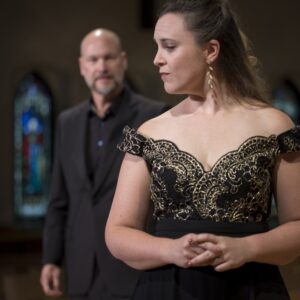This past weekend, patrons of classical and operatic music gathered beneath the majestic gothic spires of Victoria’s Christ Church Cathedral to witness George Frideric Handel’s Apollo E Dafne, presented by Early Music Vancouver (EMV) and featuring the Pacific Baroque Orchestra directed by Alexander Weimann.
The music tells the story of Apollo, a Greek god whose beauty was outpaced only by his arrogance, and Daphne, a tree dryad with stunning angelic features. At first sight, Apollo is smitten with Daphne, as the stifling fires of lust burn hot within his loins only to be unceremoniously extinguished by the frigid waters of rejection.

Apollo, an astoundingly pompous blowhard, delivers a bombastic and wearisome declaration of his intent to become viscerally familiar with the wood nymph before the fragrant rose of her youth withers into thorny brambles. Daphne coldly refuses Apollo until he resorts to a savage pursuit. The beleaguered Daphne uses magic to become a tree, and, in a fit of tragic devotion, Apollo vows to spend the rest of his days tending to her verdant leaves.
In addition to the orchestral performance, this was also a mini-opera, featuring the vocal talents of Tyler Duncan and Jacqueline Woodley, who sing with impressive fortitude and resilience for an hour in dazzlingly eloquent Italian. Up until now, my view of opera was distasteful, imagining gaudy characters caterwauling with ear-splitting shrieks to an audience who can’t comprehend a lick of it. Fortunately, in this case, the lyrics were transcribed and translated, allowing listeners to read along.
Despite wearing no costumes and standing nearly unmoving before a small ensemble, the vocalists gave impassioned performances, truly embodying the tragic duo and never breaking character, even during scenes within which they were not performing. For example, during a Daphne solo, I perchance glanced to Apollo sitting quietly offstage, and was delighted to see him effusing the smug, self-satisfied charisma embodied by the tedious vainglorious since time immemorial. Through incredibly skilled vocal feats, Duncan and Woodley breathed life into their roles and kept me captivated by the electrifying power of their voices.
In accompaniment, the Pacific Baroque Orchestra delivered an energetic and talented rendition of Handel’s work, penned over 300 years ago. This really illustrates the versatility of classical composition work, which out of necessity had to be written for future performance. In contrast, modern music is recorded as a snapshot of a single artist, and even if other bands perform covers, it’s still considered derivative, overshadowed by copyright laws and doomed to comparison.
This results in an oppressively individualist industry, which is why in another 300 years, when The Beatles are a distant memory, classical works will still live on with each new performance. Fortunately, the art of composition is not dead, and new composers to this day are writing modern masterpieces to be performed for generations. As for the musical masters of antiquity, organizations such as EMV and the Pacific Baroque Orchestra are keeping this beautiful music alive, while teaching new listeners that all opera need not sound like tortured felines, and that only when the goddess of love sleeps will the world be at peace.
